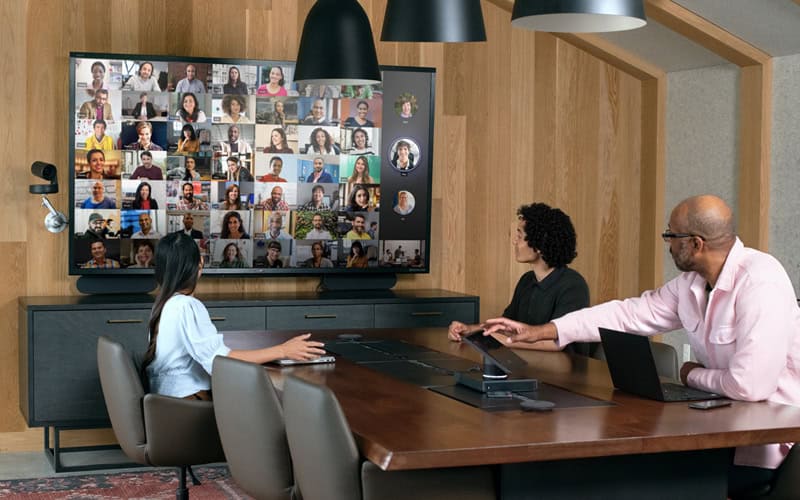Estimated to reach a value of $9.95 billion by 2028, the video conferencing landscape has never been bigger. Driven by the rise of a new workforce, where employees can work easily from any environment with an internet connection, conferencing tools are on the rise. For many companies, the heart of the new “digital workplace” is Microsoft Teams.
Now boasting more than 250 million monthly users, Microsoft Teams is the go-to tool for the hybrid workforce. The technology instantly enables quick, efficient video meetings, with access to a host of tools for collaboration, like screen sharing, file hosting, and instant chat.
However, as effective as Microsoft Teams is as a software solution, it can only do so much without the support of the right tools and hardware. That’s where the Teams meeting room system comes in. Room systems are the easiest way to equip your team for productivity in today’s hybrid working landscape. Let’s explore what they can do.
What is a Room System?
A room system is a comprehensive kit of tools designed to leverage and enhance your existing collaboration software and meeting tools. In the case of a Microsoft Teams Room system, for instance, you’ll get all the tools you need to enable people in a modern meeting room to launch a presentation or conference in a matter of seconds.
Room systems are designed to provide a simpler, more efficient alternative to the old-fashioned conference room setup strategy. In the past, companies had to invest fortunes in ad-hoc meeting room hardware, designed specifically for their designated space. Now, with a meeting room system, brands can immediately plug their hardware into the Microsoft Teams ecosystem and turn any space into an effective conferencing hub.
While the exact features of your room system will usually vary depending on your specific needs, most Microsoft room systems include:
- A control panel: The control panel is the central tablet or tool used to set up your meeting room, invite remote employees to a conference, and even book rooms for later.
- Meeting software: In the case of a Microsoft Teams Room System, your software will include licenses for Microsoft Teams, as well as integrations to any additional tools you need to work within the Microsoft Teams environment.
- Audio technology: Plug-and-play microphones with noise-cancelling functionality, and high-quality speakers that remain clear and consistent.
- Video streaming tools: Simple but effective meeting room cameras can capture your entire conferencing space with HD image quality, or even track specific speakers.
- Tech accessories: Some room systems may also include additional tech accessories, like whiteboards, where employees can sketch ideas on a digital screen.
Why Do Teams Need Room Systems?
Room system solutions have grown increasingly popular in the last couple of years, because the way we meet and collaborate is changing at an incredible scale. Today, fewer meetings and presentations are held in large boardrooms. Conversations are becoming more ad-hoc, agile, and flexible, with attendees taking part in a meeting from all over the world.
A “Room System” for a solution like Microsoft Teams gives companies the plug-and-play simplicity required to set up an effective meeting room environment with as little complexity as possible. The right meeting room system can:
- Reduce IT headaches: The best room systems are extremely easy to set up and use, requiring less input from IT professionals and engineers. Tools equipped for a Microsoft Teams meeting room environment are particularly valuable, because administrators can control, track, and roll software updates out to their hardware remotely. You can even use your connected room system tools to track important metrics about room use.
- Enable hybrid work: Perhaps the most important feature of the Room System is the ability to connect remote and in-office employees. With a Microsoft Teams room system, you can ensure employees both in the office and working remotely can connect through the same digital experience. Everyone will have access to the same features in real-time, including video streaming, shared screens, and so much more.
- Reduced investment: Purchasing an entire conferencing room system used to be a very expensive and complex process. However, this doesn’t have to be the case with Microsoft Teams Rooms Systems. You can integrate new technology with your existing hardware in the workplace, to reduce initial expenditure. Since you don’t have to worry as much about hiring engineers for maintenance and setup, you can reduce costs here too.
- Easy scaling: Most of the time, if you wanted to upgrade a small meeting room to be powerful enough for a larger space, you’d need to start your technology investment from scratch. With a Room System, you can easily access all the technology you need for a flexible meeting space, and simply expand by adding a few extra microphones or another camera whenever necessary. It’s extremely simple to scale.
- Access to the latest features: Because the software powering your Room Systems comes from Microsoft and the cloud, you’re able to access the most exciting new technology in no time. You can implement everything from real-time translation and transcription, to digital whiteboarding, and AI assistants with minimal headaches. It’s the easiest way to make sure your meeting rooms stay ahead of the curve.
Time to Invest in Your New Room System?
A room system is the perfect way to unify in-office and remote workers in the new age of hybrid work. It’s also an incredible tool for ensuring companies can always be ready for things like demonstrations, presentations, and interactions with crucial clients.
In an environment where digital conversations are becoming increasingly common, companies need to ensure they’re ready to jump into a meeting at any moment. A Microsoft Teams room system can enable this, giving everyone in your workforce instant access to tools for collaboration and communication, without unnecessary complexity.
If you haven’t invested in a Room System yet, now could be the ideal time to start thinking about whether a new solution is right for you. Get in touch if you’d like to discuss your options.




